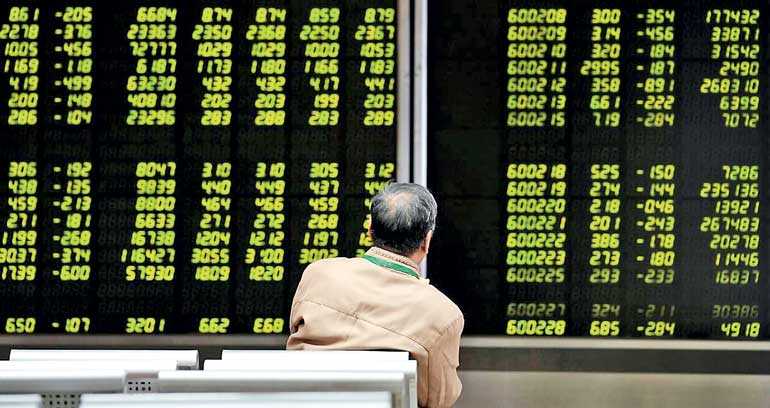Saturday Feb 14, 2026
Saturday Feb 14, 2026
Tuesday, 9 October 2018 00:00 - - {{hitsCtrl.values.hits}}

SHANGHAI (Reuters): Shares in Asia slumped Monday as China’s markets stumbled in their first trading day after a one-week holiday even though Beijing’s central bank increased liquidity to offset the impact of an escalating trade dispute with the United States.
European markets were also set to weaken, with financial spreadbetters expecting the FTSE to open 0.07% lower, Frankfurt’s DAX down 0.03%, and Paris’ CAC down 0.1%.
The People’s Bank of China (PBOC) on Sunday cut the level of cash that banks must hold as reserves, aimed at lowering financing costs as policymakers worry about fallout from the tariff row with the United States.
Reserve requirement ratios (RRRs) – currently 15.5% for large commercial lenders and 13.5% for smaller banks – will be cut by 100 basis points effective 15 October, the PBOC said, matching a similar-sized move in April.
Asian shares were also hit on Monday as investors in Chinese stocks reacted for the first time to new pressure from Washington and a report that Chinese spies had compromised US hardware.
At 0540 GMT, China’s blue-chip CSI300 index was 3.5% lower while the main Shanghai Composite Index was down 2.9%. The tech-heavy ChiNext board fell 3.08%.
The losses in China dragged down MSCI’s broadest index of Asia-Pacific shares outside Japan, which was 0.9% lower.
James McGlew, executive director of corporate stockbroking at Argonaut Ltd. in Brisbane, said Chinese investors were catching up after global markets turned lower during China’s week-long National Day holiday. “That is exacerbated by the fact that you would have had quite a few long positions going into that time-off and people just quit them and were hitting the bid today,” he said.
“We’ve been expecting for some time now the US market to start delivering volatility. We find it quite difficult to reconcile the political machinations that are going on over there being friendly to markets.”
On Thursday, US Vice President Mike Pence highlighted disputes with China on issues such as cyberattacks, Taiwan, freedom of the seas and human rights, marking a sharpened US approach toward Beijing beyond the trade war.
On Friday, Chinese technology stocks listed in Hong Kong slumped on a Bloomberg report that the systems of multiple US companies had been compromised by malicious computer chips inserted by Chinese spies.
On Monday, Hong Kong’s Hang Seng index was down 0.5% and a sub-index tracking information technology firms was 0.9% lower.
China’s yuan was weaker at 6.8981 per US dollar at 0519 GMT, compared with a previous onshore close of 6.8725 per dollar. Earlier on Monday, the PBOC set the midpoint of the yuan’s daily trading band at 6.8957 per dollar, its weakest level since May 11, 2017.
The offshore yuan was also weaker at 6.9050 per dollar.
Higher yields on US Treasuries are likely to put more pressure on the yuan as China continues to make use of targeted policy easing to energise the domestic economy.
“We expect the PBoC will continue its easing efforts to keep liquidity ample and loosen its credit control to make funds more accessible to the broader economy,” BofA Merrill Lynch analysts said in a note.
“Moreover, there is still room for further RRR cuts when necessary, though the chance for an interest rate cut is limited given the continued Fed rate hiking cycle, in our view.”
On Monday, the spread between Chinese and US 10-year Treasury bonds was 58.1 basis points according to Eikon data, compared with 150 basis points at the end of 2017.
Equity markets around the world came under pressure last week after a steep sell-off in US Treasuries, prompted by hawkish comments from US Federal Reserve officials and data widely seen as supporting further US rate hikes.
Friday’s US non-farm payrolls showed job creation slowed in September, likely from Hurricane Florence’s impact on restaurant and retail payrolls, but the Labour Department report also showed a rise in wages that could keep the Federal Reserve on track for more interest rate hikes.
Investors are also keeping an eye on Brazil after right-wing Congressman Jair Bolsonaro won nearly half the votes in Brazil’s first-round presidential election on Sunday, marking a major shift to the right in Latin America’s largest nation fuelled by voters’ anger at corruption.
In currency markets, the dollar was 0.1% stronger against the yen at 113.83, while the euro was 0.1% weaker against the dollar at $ 1.1512.
The dollar index, which tracks the greenback against a basket of six major rivals, was up 0.09% at 95.707.
Oil prices fell more than 1% after the US said it may grant waivers to sanctions against Iran’s oil exports next month, and as Saudi Arabia was said to be replacing any potential shortfall from Iran.
US crude was down 0.7% at $ 73.80 a barrel. Brent crude fell 0.9% to $ 83.38 per barrel.
Spot gold fell 0.5% to $ 1,196.51 per ounce.